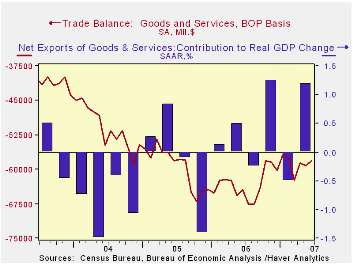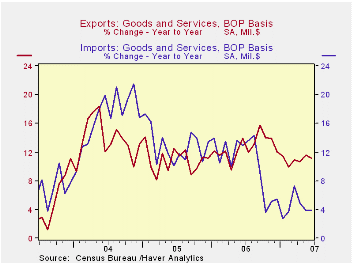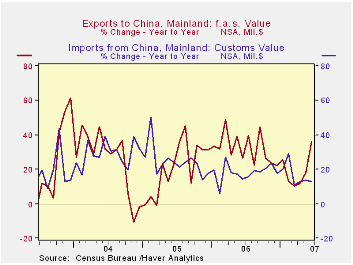 Global| Aug 14 2007
Global| Aug 14 2007U.S. Trade Deficit Narrowed
by:Tom Moeller
|in:Economy in Brief
Summary
In June, the U.S. foreign trade deficit narrowed to $59.2B from a revised $59.2B in May. Consensus expectations had been for a deeper deficit of $62.0B. Total exports jumped 1.5% after also surging 2.6% in May. The gain mostly [...]

In June, the U.S. foreign trade deficit narrowed to $59.2B from a revised $59.2B in May. Consensus expectations had been for a deeper deficit of $62.0B.
Total exports jumped 1.5% after also surging 2.6% in May. The gain mostly reflected higher exports of industrial supplies. Exports of non-auto consumer goods fell 1.4% (+9.2% y/y) while capital goods exports rose just 0.2% (5.2% y/y). Exports of advanced technology goods rose a strong 8.5% (NSA, 9.0% y/y).
Exports of services from the U.S. were firm again and rose 0.6% (13.2% y/y) while imports of services rose the same 0.6% (4.7% y/y).
Imports of nonpetroleum products were strong again and increased 1.0% (4.6% y/y) but imports of petroleum products fell 0.2% (-1.1% y/y). Capital goods imports jumped again, in June by 1.6% (7.0% y/y) but imports of nonauto consumer goods fell 0.6% (+5.9% y/y). Imports of advanced technology products surged 8.3% (12.3% y/y).
Globalization and Capital Markets: Implications for Inflation and the Yield Curve is a speech delivered by Fed Governor Randall S. Kroszner and it can be found here.
| Foreign Trade | June | May | Y/Y | 2006 | 2005 | 2004 |
|---|---|---|---|---|---|---|
| U.S. Trade Deficit | $58.1B | $59.2B | $64.5B (6/06) |
$758.5 | $714.4B | $612.1B |
| Exports - Goods & Services | 1.5% | 2.6% | 11.2% | 12.7% | 10.9% | 13.7% |
| Imports - Goods & Services | 0.5% | 2.1% | 3.8% | 10.4% | 12.9% | 16.8% |
Tom Moeller
AuthorMore in Author Profile »Prior to joining Haver Analytics in 2000, Mr. Moeller worked as the Economist at Chancellor Capital Management from 1985 to 1999. There, he developed comprehensive economic forecasts and interpreted economic data for equity and fixed income portfolio managers. Also at Chancellor, Mr. Moeller worked as an equity analyst and was responsible for researching and rating companies in the economically sensitive automobile and housing industries for investment in Chancellor’s equity portfolio. Prior to joining Chancellor, Mr. Moeller was an Economist at Citibank from 1979 to 1984. He also analyzed pricing behavior in the metals industry for the Council on Wage and Price Stability in Washington, D.C. In 1999, Mr. Moeller received the award for most accurate forecast from the Forecasters' Club of New York. From 1990 to 1992 he was President of the New York Association for Business Economists. Mr. Moeller earned an M.B.A. in Finance from Fordham University, where he graduated in 1987. He holds a Bachelor of Arts in Economics from George Washington University.
More Economy in Brief
 Global| Feb 05 2026
Global| Feb 05 2026Charts of the Week: Balanced Policy, Resilient Data and AI Narratives
by:Andrew Cates






